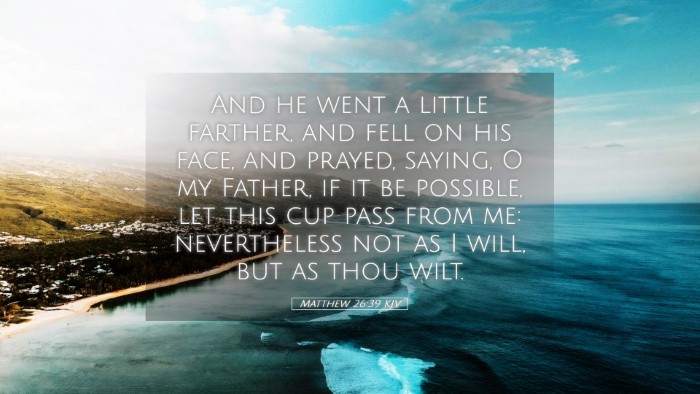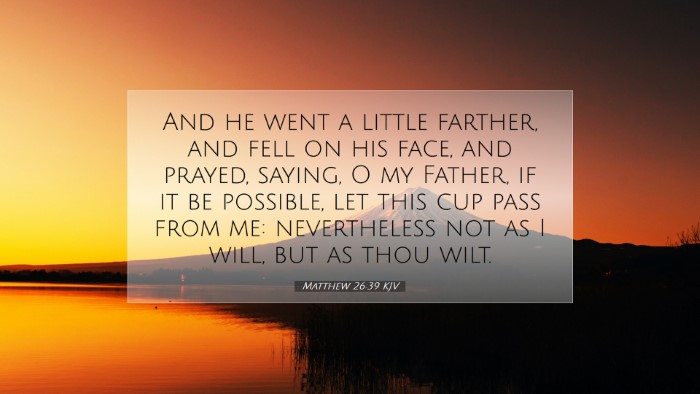Matthew 26:39 - Commentary
Verse: "And going a little farther, he fell on his face and prayed, saying, 'My Father, if it be possible, let this cup pass from me; nevertheless, not as I will, but as you will.'" (Matthew 26:39)
Introduction
This verse captures one of the most poignant moments in the life of Jesus, set in the Garden of Gethsemane just before his crucifixion. The prayers of Jesus illustrate the essence of compassionate obedience and the profound struggles of his humanity. Commentators such as Matthew Henry, Albert Barnes, and Adam Clarke provide rich theological insights that deepen our understanding of this passage.
Contextual Analysis
In the immediate context of this verse, we find Jesus grappling with the impending Passion. The preceding chapters of Matthew present the Last Supper and Jesus' predictions of his betrayal. As he enters the Garden, he experiences the weight of the world on his shoulders, knowing the pain and suffering awaiting him. Henry notes how this period of prayer reflects Jesus' dual nature - fully divine yet fully human - as he seeks communion with the Father during his darkest hour.
Theological Implications
Matthew Henry emphasizes the significance of the 'cup' that Jesus refers to in his prayer. This cup symbolizes the impending suffering, the wrath of God against sin, and the burden of atonement that Jesus was about to bear. It is a metaphor for the trials and tribulations he was about to undergo on behalf of humanity.
Albert Barnes expands on this idea by noting that the plea for the cup to pass signifies Jesus' awareness of the intense anguish that awaited him. He acknowledges the reality of suffering yet submits entirely to the will of the Father. Barnes states that this submission is a model for believers who are often called to surrender their own wills in the face of hardship.
Humanity and Divinity in Prayer
The prayer of Jesus demonstrates a profound interaction between his humanity and divinity. Adam Clarke remarks on how Jesus, though perfect and sinless, experienced real emotions, fears, and turmoil. His decision to pray and seek the Father’s guidance exemplifies a key aspect of Christian life - reliance on God through prayer, especially in times of distress.
Expressions of Conflict
This verse deeply expresses the conflict faced not only by Jesus but by every believer. There is the inherent struggle between self-preservation and obedience to God’s will. Henry notes, "It is not sinful to desire that which is for our ease." Nevertheless, the example set forth by Christ teaches believers the importance of ultimately aligning their desires with God's will.
Divine Submission
The phrase "not as I will, but as you will" serves as the crux of Jesus' prayer. Herein lies a profound truth about divine submission. Barnes points out that this submission to God’s will reflects perfect obedience and an acknowledgment of God's sovereignty. It teaches us that even in moments of pain and anguish, we must strive to submit to God's higher purpose.
Implications for Believers
This passage offers significant implications for contemporary believers. The importance of prayer in the face of life's challenges is unmistakable. Clarke suggests that believers should emulate Christ's example by bringing their burdens to prayer, expressing their fears while ultimately committing their situations to God's plan.
- Prayer as a First Response: Rather than a last resort, prayer should be the initial response to impending trials.
- Surrender: The necessity of surrendering personal desires for God’s greater will is underscored.
- Unity with God: Believers are encouraged to foster a deep, communicative relationship with God, just as Jesus did.
Conclusion
Matthew 26:39 encapsulates a pivotal moment in the narrative of Christ's crucifixion, illustrating profound themes of obedience, struggle, and divine purpose. The insights from Matthew Henry, Albert Barnes, and Adam Clarke converge to highlight the beauty of Christ's prayerful submission in the face of suffering, providing a template for all believers in their own spiritual journeys.


